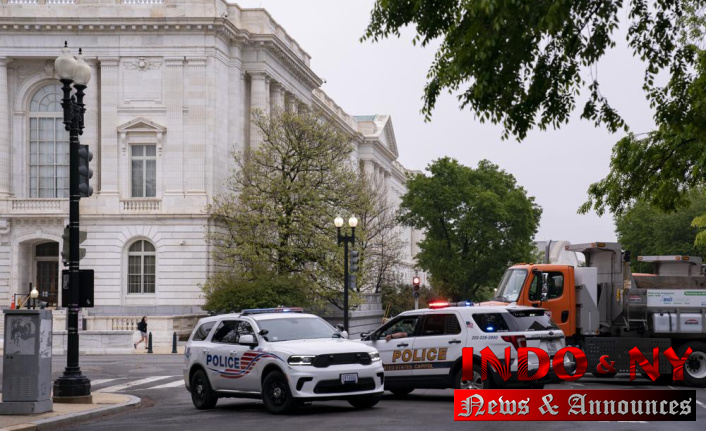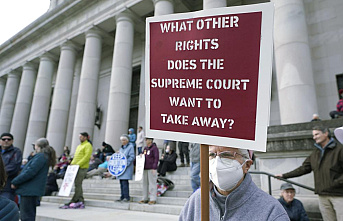Chief Justice John Roberts ordered an investigation into an "egregious violation of trust" in the leaked Supreme Court abortion draft opinion. He also tasked an unnamed court official with the task. This could be the most prominent investigation in decades.
The Supreme Court marshal has begun an investigation to find the source of the leak. This was a shocking breach of protocol that caused shock waves throughout the Supreme Court and Washington legal communities.
Roberts stated that the investigation was ordered because of the "unique and egregious breach" of trust.
There are many questions about the process of investigation and whether there was a federal crime. A separate question is about the Marshal's powers to locate the leaker of the documents.
Roberts stated, "To the extent that this betrayal by the Court's confidences was intended to undermine our operations' integrity, it will fail." "The Court's work will not be affected in anyway."
Despite the fact that the Biden administration has restricted the government's ability of seizing records from reporters, court marshals operate outside of the chain of command, opening up the possibility of an investigation without traditional guardrails to protect journalists’ sources.
Here are some examples of the possible outcomes of this investigation.
Is IT A CRIME
This is a legal issue, but experts agree that it would be very difficult to bring a criminal case.
Renato Mariotti, a former federal prosecutor said in a tweet that "there is no special statute making it a crime for you to disseminate draft Supreme Court opinions or other private court documents."
However, many senators, especially Republicans, called for an extensive investigation into the leak and the prosecution of the individual responsible.
Senator John Kennedy (Republican from Louisiana) demanded that the FBI investigate the leak. Senator John Kennedy, R-La., demanded that the FBI investigate the leak. Senate Minority Leader Mitch McConnell (R-Ky.) also called for the Justice Department "to pursue charges if applicable."
The Justice Department generally pursues leak investigations when classified data is illegally released to the general public. However, that is not the case in this instance. Although it is possible to argue that the publication of the draft could be considered theft of government property by some, the guidelines of the Justice Department suggest that a prosecution would not be likely.
However, many senators, especially Republicans, called for an extensive investigation into the leak and the prosecution of the individual responsible.
Senator John Kennedy (Republican from Louisiana) demanded that the FBI investigate the leak. Senator John Kennedy, R-La., demanded that the FBI investigate the leak. Senate Minority Leader Mitch McConnell (R-Ky.) also called for the Justice Department "to pursue charges if applicable."
The Justice Department generally pursues leak investigations when classified data is illegally released to the general public. However, that is not the case in this instance. Although it is possible to argue that the publication of the draft could be considered theft of government property by some, the guidelines of the Justice Department suggest that a prosecution would not be likely.
ADVERTISEMENT
Federal law forbids the theft of or receipt of government information. However, the Justice Department guidelines state that it is inappropriate to bring a case under the law if the person has legitimate access to the information/documents and uses it "for disseminating them to the public."
Who IS THE MARSHAL CHARGING THE INVESTIGATION
Col. Gail A. Curley is the court's marshal. She came from the U.S. Army. Her tenure has been less than one year. She is the marshal of the court's administrative side and has many responsibilities. She is the court’s chief security officer and oversees a staff of around 260 employees, including the police force providing security for the Supreme Court building and justices. She is also the building's facilities manager. She is also responsible for ensuring that the court hears all arguments. Oyez! Oyez!, which is "hear you."
Curley assumed the role of marshal after the retirement of Pamela Talkin, the long-serving Marshal of the court. Curley was to provide legal advice and support for senior Army leaders on national security law while she was working for the Army. Her military career also included stints in Germany and Afghanistan.
Curley graduated from U.S. Military Academy. She also holds a law degree at the University of Illinois College of Law. Two master's degrees were awarded to Curley by military schools.
What does an investigation look like?
At this stage, it is unclear. Although the marshal could conduct the investigation, she is more likely to call in help.
Access to the draft opinion is available to the court's nine justices, some staff, and a few dozen law clerks. These young lawyers assist the justices for one year. In theory, the marshal could hire an outside firm to help with the investigation. In other cases involving judicial documents, the FBI may be called in to assist.
A Justice Department spokesperson said Tuesday that they had not been asked to assist in the search for the leaker of the document.
All law clerks must sign a code that guarantees confidentiality. The code, which dates back to 1989, states that the law clerk must ensure that Court documents not accessible to the public are not removed from the Court building.
A probe will likely focus on the reasons for the leak, including whether the information was deliberately given to Politico by a judge or accidentally made available to someone who sent a draft to the news agency.
CAN THE MARSHAL RECORD THE JOURNALISTS' RECORDS?
Maybe. However, in most cases investigators will need to explain why they believe the crime occurred to be able to get records from companies that would keep email or telephone records.
This investigation is quite unusual, and the Supreme Court has not searched for anyone who accessed this information in the digital age.
The use of subpoenas, warrants to seize records of journalists involved in leak investigations has been significantly reduced by the Biden administration. These restrictions wouldn't likely apply to this investigation because the Supreme Court marshal doesn't report directly to the executive branch.
After an outcry about revelations that The Justice Department had infiltrated records of journalists at The Washington Post and CNN as part of leak investigation into who had revealed government secrets regarding the Russia investigation, Attorney General Merrick Garland officially prohibited prosecutors from seizing journalist's records.
Garland's policy, which has limited exceptions for prosecutors who could get the records, reverses years of Justice Department policy. It aims to resolve an issue long vexed by prosecutors trying to balance the First Amendment rights of the media against the government's desire protect sensitive and classified information.
However, the marshal of Supreme Court reports directly to the court or the chief justice, and would not be subject to these restrictive guidelines. It's not clear whether the marshal, or other investigators involved in the investigation, could issue subpoenas to obtain records from Politico journalists or others.
Although the Supreme Court marshal has served subpoenas before, the most public instance was in 1915, when a Civil War soldier stole Martha Washington's will. This will was later sold to a New York banker. In an attempt to collect the will, the state of Virginia brought the case to Supreme Court.
WHAT'S NEXT?
It is difficult to know. Roberts stated that he had instructed the marshal to investigate where the leak was coming from. Roberts didn't specify how long it would take to complete the investigation. He did not say whether the investigation would be restricted to the court or extended to journalists who were involved in publishing the opinion. He also didn't mention whether the results would be eventually made public.
The court is very busy at the time the investigation begins. Just at the beginning of April, the justices had just completed hearing arguments in cases. They spend May and Junie completing their opinions. These are issued before they go on a summer break. They return to the bench in October to hear new cases.












